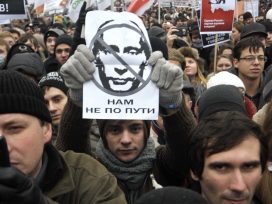86 articles

The revelations since March 2018 about the mining of 87 million Facebook accounts to micro-target voters in the US and the UK served as the biggest wake-up call since the NSA affair in 2013 about how the non-consensual use of personal data can compromise democratic processes. While the earlier controversy drew attention to the failure of democratic accountability on the part of state agencies, this time social media giants were in the public spotlight. Shocking as the scale and technical sophistication of the political campaigning operations were, the political core of the scandal was Facebook’s disregard for standards of transparency and the lack of any regulatory framework for the use of data in influencing electoral outcomes.
As openDemocracy’s Adam Ramsay writes in this focal point, the scandal casts new light on the successes of Trump in the US and the Brexit campaign in the UK. Concentration on the dynamics of voter disaffection, Ramsay argues, risks overlooking how these victories for nationalist populism were the consequence of collaboration between neoliberal elites, the tech industry and the private intelligence sector. Even before the Facebook affair, trust was low between the public and a tech industry whose aversion to transparency is engrained into its corporate culture. However, writes privacy campaigner Simon Davies, internal secrecy is unsustainable in a world where trust is critically important to corporate and political success. This is why tech needs privacy by design – in other words protections built into software itself – to repair a problem management is incapable of fixing.
Last year’s revelations showed that where online technologies and their political use are closed to society, democracy is weak – even if formal democratic structures are in place. This is not to downplay the capture of the internet in authoritarian settings. As sinologist and political scientist Katika Kühnreich explains, China’s ‘Social Credit Systems’ operate a form of gamified control that the Chinese government plans to introduce nationwide, so that by the end of the decade the entire nation could be under surveillance. This may seem inconceivable in the West; and yet, how different is the Chinese way from the ‘surveillance capitalism’ that prevails among our own social media? There are certainly no grounds for complacency.
Complacency might also account for why discussions of the influence of Russian disinformation often overlook the question of home-grown supply and demand – an issue addressed in Eurozine’s previous focal point ‘Disinformation and democracy’. Particularly on the issue of Russian interference in the 2016 US elections, liberal discourse has become prone to a Cold War frame of reference. One factor contributing to the escalation of hostilities may be the West’s misunderstanding of the nature of Russia’s ‘hybrid war’. As political scientist Mark Galeotti writes, this entails more than a combination of covert and overt aggression. Rather, Russia’s military and political disinformation practices need to be seen as distinct strategies.
Nor should we view the Russian internet purely in terms of threat. Investigative journalist Andrei Soldatov reminds us that it played a key role in defeating the military coup in 1991. Powerful though the influence of the Kremlin is on the Russian web, the failure of Russia’s online community to build on this democratic promise was the result of the cynicism of a pro-western yet politically impotent middle class during the first decade of the century. And it is not just in Russia that the internet’s development has been ambiguous. In a chronology of the World Wide Web’s thirty-year history, Thomas Lemaigre shows that from its outset the Web has oscillated between openness and control, liberty and domination, free-to-use and free enterprise – dynamics that will continue to define our interaction with online technologies.
Accompanying these discussions of how internet technologies are used politically are analyses of how the internet transforms democratic polities from within, by influencing how we act and think. Media scientist Baptiste Campion examines how platforms establish the parameters of interaction and looks at how users adapt to these in the interest of constructive debate. Also moving from medium to message, philosopher Antón Barba-Kay reflects on how the internet has altered our conception of the political. By removing speech from its social context, it has blurred our sense of the unsayable; by uncoupling us from our real-life community, it has made us shameless; and by fetishizing fact, it has undermined the legitimacy of shared reason. All these things, argues Barba-Kay, help explain the extraordinary success of Donald Trump.
Other contributions look at the political impacts of related technologies. Journalist Agnieszka Pikulicka-Wilczewska writes on how Russia’s growing cryptocurrency economy, until now a space of economic freedom, is being brought under state control, not least because it offers the potential to circumvent western sanctions. And activist and author Krystian Woznicki explores the implications of the use of data-driven crowd control techniques to police large-scale demonstrations – techniques which, he argues, are altering the basic conditions of political agency.
This focal point is the result of a collaboration among partner editors in the Eurozine network of cultural journals. All articles have been published in Eurozine partner magazines and in English translation here. The selection reflects the engagement across the network with a topic whose relevance and reach are hard to overestimate.
Simon Garnett, Editor




The internet is, as a medium, fundamentally changing our conception of the political. By removing speech from its social context, it has blurred our sense of the unsayable; by uncoupling us from our real-life community, it has made us shameless; and by fetishizing fact, it has undermined the legitimacy of shared reason. All help explain the extraordinary success of Donald Trump.

Nowhere is aversion towards transparency deeper than in the tech industry. The result of this corporate culture has been a massive breakdown of public trust. What management cannot fix, engineering must, argues leading privacy campaigner Simon Davies.

An investigation by openDemocracy into the financing of the Brexit campaign in 2016 has raised far-reaching questions about connections between neoliberal elites, the tech industry and the private intelligence sector. Adam Ramsay, one of the journalists involved, summarises a story vital to understanding how Britain has ended up where it is today.

Security forces increasingly use data-driven crowd control techniques to pre-empt unpredictable situations. Unlike traditional prevention methods, pre-emptive policing actively engenders crowd behaviour – and in doing so interferes with the basic conditions for political agency, argues Krystian Woznicki.

The nascent internet played a key role in defeating the military coup in Russia in 1991, writes Andrei Soldatov. However, the democratic promise of the web was never fulfilled. In the 2000s, it became a means of escape for a disaffected middle class closed out of the political process. The failed protest wave of 2011–2012 bore the mark of this ‘lost decade’. Meanwhile, in the era of political trolling, online participation has come to mean something very different.

The term ‘hybrid war’ has become synonymous with Russian aggression. It denotes a style of warfare that combines the political, economic, social and kinetic, in a kind of conflict that recognizes no boundaries between covert and overt war. However, this definition fails to recognize crucial distinctions in Russian strategy, writes Mark Galeotti.

Russia has become an important hub for cryptocurrency. To the concern of investors, the authorities are trying to bring the market under state control – not least because they are beginning to recognize crypto’s potential to bypass western sanctions.
In 1968, West German students protested against the monopoly of the Springer Press. Does the campaign have an equivalent today? Given the power and ubiquity of social media, Claus Leggewie doubts it. Like the ’68ers before them, a genuinely alternative European media must create its own means of production.
China’s digital Social Credit Systems operate a form of gamified control, rewarding users while rating them according to online and offline behaviour. By 2020, the Chinese government plans to introduce a nationwide system. Western observers are appalled, but are our own social media essentially all that different?
Critique of social media tends to focus on the content of online discourse, particularly the impacts of fake news and hate speech. But how do social media platforms themselves determine interaction, and how can users adapt to default functionalities in the interests of constructive debate?
From its libertarian origins to the big-data economy of the present, the internet has always oscillated between openness and control, liberty and domination, free-to-use and free enterprise. A brief chronology of the internet reveals a dynamic of power relationships that will continue to define how we interact with online technologies.
Data-driven political marketing and electoral hacking follow a similar principle: focus on the weakest link, whether susceptible individuals or voting machines in swing states. On what the Cambridge Analytica scandal reveals about the new arts of political campaigning.



